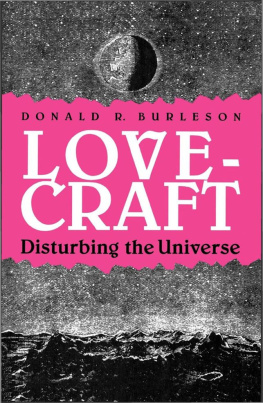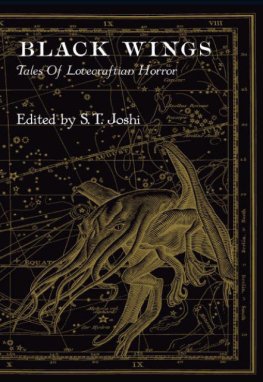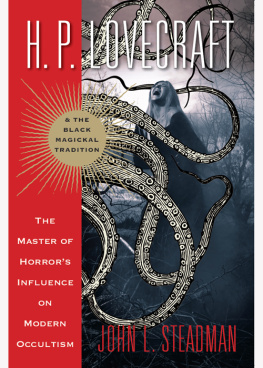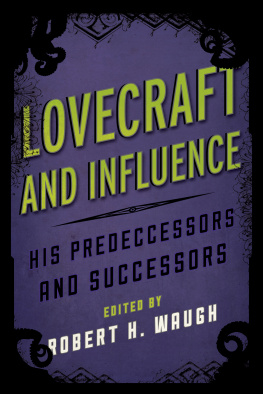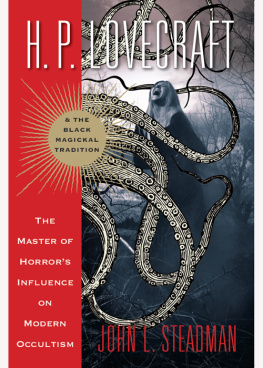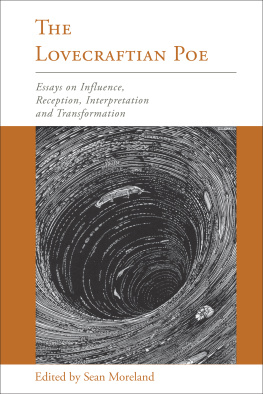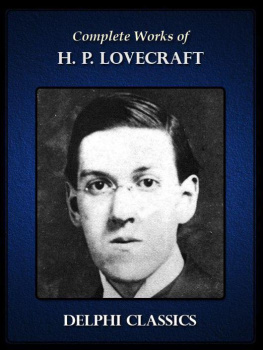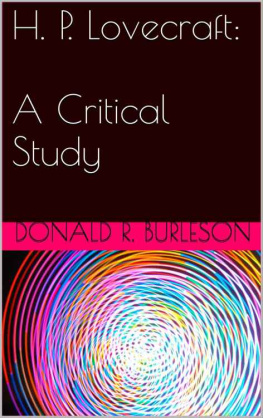_____________________________________________________________________
For S.T. Joshi
Preface
During the 1970s and 1980s, a notable amount of literary criticism began to appear on the Providence, Rhode Island, writer H.P. Lovecraft (1890-1937). Most of it belongs to such schools as formalist, Jungian-psychoanalytic, and mythic criticism. Though the present study is from a very different critical perspectivethat of post-structuralist or deconstruc-tive readingthe purpose is not to minimize the results of previous criticism. Formalism, for example, provides insights that are scarcely to be ignored. Rather, the purpose here is to look farther afield with the texts, to submit them to particular kinds of close readings that extend previous conceptions of their literary depth and show how enigmatic, as creatures of language, the texts really are. No one until now has applied the strategies of post-structuralist thinking to Lovecrafts writings, and I believe that those writings will loom all the more significant as these strategies are brought to bear on them. With the late Paul de Man, I believe that literary texts are literary precisely to the degree that their figurality encourages the protean encroachments of de-constructive reading. My particular point of view concerning post-structuralist theory and critical technique, together with a general discussion of the nature of deconstruction for those readers not intimately acquainted with the subject, is described in chapter 1.
When choosing which Lovecraft texts to explore here, I felt much like a small child visiting an ice cream parlor that offers several dozen flavors. One is tempted to pig out and eat them allmuch as Lovecraft, in the company of friends, once literally did in an ice cream parlor in downstate Rhode
Island. But such indulgence would have the usual inflating effects, alas. Deconstruction is an open-ended, generative process, capable of producing considerable commentary on any particular text, and one must practice a certain reluctant economy. Short of resigning to the inevitability of corpulence, one cannot try all the flavors. In particular, I have resisted the temptation to take on Lovecrafts novels here; even The Case of Charles Dexter Ward alone, with its wealth of raw materials, would require a volume the size of this one to do it justice. For similar reasons, I decided to omit the novella The Shadow Out of Time. Lovecrafts longer work is represented, however, with a discussion of the novella The Shadow over Innsmouth. Though there is a certain general valuational aspect to choosing texts, my selection here of thirteen storiesa post-structuralist bakers dozen, a coven of stories does not imply that pieces not chosen deserve to be neglected. Certainly some of the tales not selected here have a great deal to commend them and could themselves be deconstructed to good effect. My choices, not arbitrary but not possible to defend to every readers liking either, simply reflect a realistic assessment of how much it is possible to include and a feeling that certain texts would be uncommonly interesting to work with. A few of the stories chosen have long been considered major Lovecraft pieces from more traditional viewpoints (e.g., The Colour Out of Space and The Dun-wich Horror), while a few of the others are stories perhaps less often read, though this consideration alone does not necessarily account for their inclusion or exclusion.
Even with the texts selected, I have practiced of necessity a certain economy Deconstruction never really ends, never exhausts all possibilitiesyet functioning between the covers of a book, one must in fact stop somewhere, at a point at which one feels that a gratifying amount of insight into the open mystery of the texts has emerged.
Even after having read and reread Lovecraft for thirty-five years, I have found the texts newly productive of mystery and wonder upon deconstructive reading. I invite the reader to share the experience.
I would like to thank Arkham House for kindly granting permission to quote from the works of H.P. Lovecraft.
For his help, inspiration, and friendship over the years that I have known him, I would like to thank Lovecraft scholar S.T. Joshi, to whom this volume is dedicated.
Finally, but especially, I extend loving thanks to my wonderful wife, Mollie (a serious Lovecraftian in her own right), for whom, during the trying times of the writing of this book, the post-structuralist notion of absence has, I fear, taken on special meaning.
The Lovecraft stories treated here are found in the three major collections of revised texts published by Arkham House (see Bibliography), and citations in the text will refer to these sources with the following abbreviations:
ATM At the Mountains of Madness and Other Novels
DAG Dagon and Other Macabre Tales
DUN The Dunwich Horror and Others
In each chapter deconstructing a particular story, the appropriate designation will be given once for the source of the text, and further references to the same text will simply provide page numbers.
I should also mention here that all Indo-European roots and other etymological data have been taken from the American Heritage Dictionary of the English Language (Boston: Houghton Mifflin Company, 1969) and Joseph T. Shipleys The Origins of English Words: A Discursive Dictionary of Indo-European Roots (Baltimore, Md.: Johns Hopkins University Press, 1984).
l. Pre-Iude:
The Manner of Reading
By the time structuralism, as a school of literary criticism and theory, fully arrived in America in the 1960s by way of translations from the French, it was already in the process of being unsettled, reconsidered and reshaped into a yet newer mode of thinking about literary texts, a mode that has come to be called post-structuralism. The term is a broad umbrella covering a variety of viewpoints, and its relation to its predecessor, classical structuralism, is by no means one of complete separation; post-structuralism is clearly an outgrowth and extension of structuralism. Critical theorist Richard Harland has even coined the term superstructuralism to cover the enormous range of critical and interpretative activity from early scientific structuralism all the way to post-structuralism in its most modern and radical forms. Classical structuralism as a way of thinking has of course spanned many fields, including linguistics, anthropology, and psychoanalysis, as well as literary criticism. In application to literature, the chief methodology of the post-structuralist approach to textual commentarythough it resists being characterized as methodology in the usual senseis that of deconstruction.
The sort of thinking from which the theory of deconstruction has developed has been with us for longer than is widely believed. Some commentators have found suggestions of de-constructive thought as early as the fifth century b.c., in the writings of Gorgias, and the similarity between some de-constructive attitudes and certain aspects of ancient Eastern philosophy has been noted. But deconstruction has flowered into an intellectual movement from the late 1960s onward due primarily to the impact of contemporary French philosopher Jacques Derrida, and to the taking up of his banner (carried at various angles) by those critics who have become known as the Yale deconstructionists: Paul de Man, J. Hillis Miller, Geoffrey Hartman, and (to a lesser degree and with greater reservations) Harold Bloom. Derridas founding contributions to the theory owe much to relatively recent philosophical sources, particularly to Friedrich Nietzsche (directly) and to Martin Heidegger (somewhat obliquely). In all respects deconstruction has a way of continuing to seem new, however old its roots. The primary reason, it seems to me, is its radically strange natureits open courting of paradox, its encouragement of peculiar and seemingly perverse (if rigorous) modes of reading texts. Deconstruction is not the sort of thing with which one can ever fully come to terms. One does not experience a sense of final mastery over deconstruction, does not reduce it to any pat formulaic paradigm. Understanding and coping with deconstruction is a bit like nailing Jello to the wall; some of it sticks, but some of it always slips mockingly away. If it were not so, deconstruction would not be itself, if indeed it is itself, which it would not hesitate to dispute. Deconstruction is an unsettling way of thinking, but, I do not fear to predict, it is here to stay.
Next page
